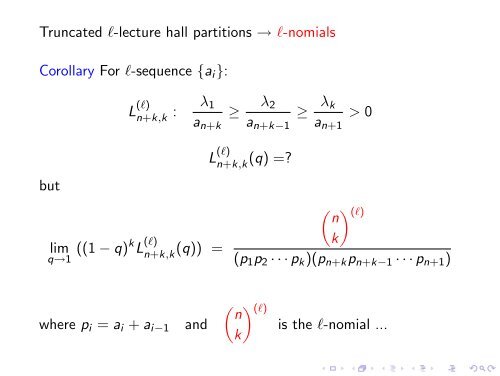Euler's partition theorem and the combinatorics of -sequences
Euler's partition theorem and the combinatorics of -sequences Euler's partition theorem and the combinatorics of -sequences
Theorem [Corteel,S 2004] Given positive integers s 1 , . . . , s n , the generating function for the sequences λ 1 , . . . , λ n satisfying is λ 1 s 1 ≥ λ 2 s 2 ≥ · · · ≥ λ n−1 s n−1 ≥ λ n s n ≥ 0 ∑ s2 −1 ∑ s3 −1 z 2 =0 z 3 =0 · · · ∑s n−1 s 1 z 2 z n=0 q⌈ s 2 ∏ n i=1 (1 − qb i ) ⌉+ P n i=2 z i ∏ n−1 i=2 qb i ⌈ z i+1 − z i ⌉ s i+1 s i where b 1 = 1 and for 2 ≤ i ≤ n, b i = s 1 + s 2 + · · · + s i . Corollary As q → 1, (1 − q) n × this gf −→ s 2 s 3 · · · s ∏ n n i=1 b . i
Truncated l-lecture hall partitions → l-nomials Corollary For l-sequence {a i }: L (l) n+k,k : λ 1 a n+k ≥ λ 2 a n+k−1 ≥ λ k a n+1 > 0 but L (l) n+k,k (q) =? ) (l) lim ((1 − q→1 q)k L (l) n+k,k (q)) = ( n k (p 1 p 2 · · · p k )(p n+k p n+k−1 · · · p n+1 ) where p i = a i + a i−1 and ( n k ) (l) is the l-nomial ...
- Page 1 and 2: Euler’s partition theorem and the
- Page 3 and 4: Overview Euler’s partition theore
- Page 5 and 6: Overview 1, 2, 3, . . . l-sequences
- Page 7 and 8: Overview 1, 2, 3, . . . l-sequences
- Page 9 and 10: Sylvester’s Bijection
- Page 11 and 12: l-sequences For integer l ≥ 2, de
- Page 13 and 14: l-sequences For integer l ≥ 2, de
- Page 15 and 16: l = 2 The l-Euler theorem [BME2]: T
- Page 17 and 18: l = 3 The l-Euler theorem [BME2]: T
- Page 19: The insertion step To insert a k +
- Page 22 and 23: Binary numeration system 1 0 1 1 0
- Page 24 and 25: Binary numeration system 1 0 1 1 0
- Page 26: Theorem [Fraenkel 1985] Every nonne
- Page 31 and 32: Lecture Hall Partitions
- Page 33 and 34: The Lecture Hall Theorem [BME1] The
- Page 35 and 36: Θ (l) n : Bijection for the l-Lect
- Page 44 and 45: Truncated lecture hall partitions L
- Page 48 and 49: The l-nomial coefficient Example (
- Page 50 and 51: Let u l and v l be the roots of the
- Page 52 and 53: Let u l and v l be the roots of the
- Page 54 and 55: An l-nomial theorem [LS]: An analog
- Page 56 and 57: A coin-flipping interpretation of t
- Page 58 and 59: Define a q-analog of the l-nomial:
- Page 60 and 61: Another q-analog of the l-nomial Le
- Page 62 and 63: Question: When l = 2, several refin
- Page 64 and 65: Question: What is the generating fu
- Page 66 and 67: CanaDAM 2009 2nd Canadian Discrete
Truncated l-lecture hall <strong>partition</strong>s → l-nomials<br />
Corollary For l-sequence {a i }:<br />
L (l)<br />
n+k,k : λ 1<br />
a n+k<br />
≥ λ 2<br />
a n+k−1<br />
≥<br />
λ k<br />
a n+1<br />
> 0<br />
but<br />
L (l)<br />
n+k,k<br />
(q) =?<br />
) (l)<br />
lim ((1 −<br />
q→1 q)k L (l)<br />
n+k,k (q)) =<br />
( n<br />
k<br />
(p 1 p 2 · · · p k )(p n+k p n+k−1 · · · p n+1 )<br />
where p i = a i + a i−1<br />
<strong>and</strong><br />
( n<br />
k<br />
) (l)<br />
is <strong>the</strong> l-nomial ...



